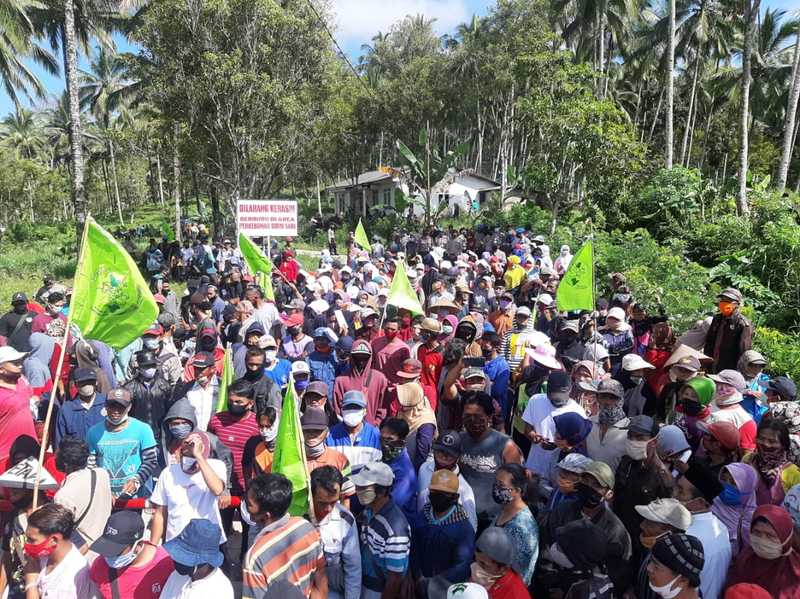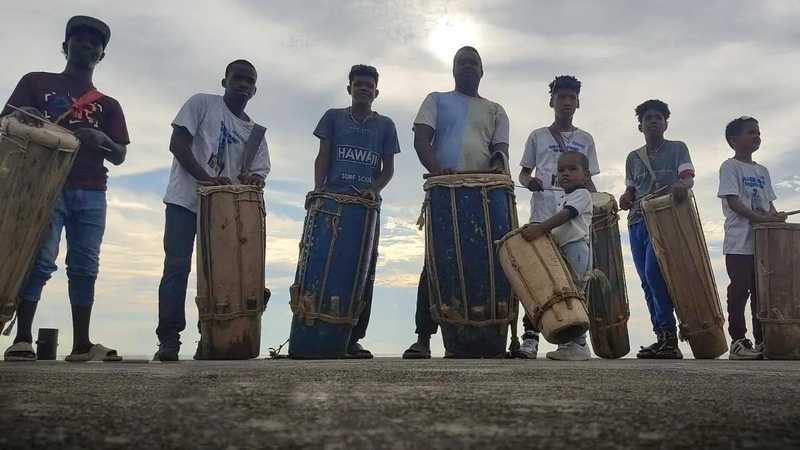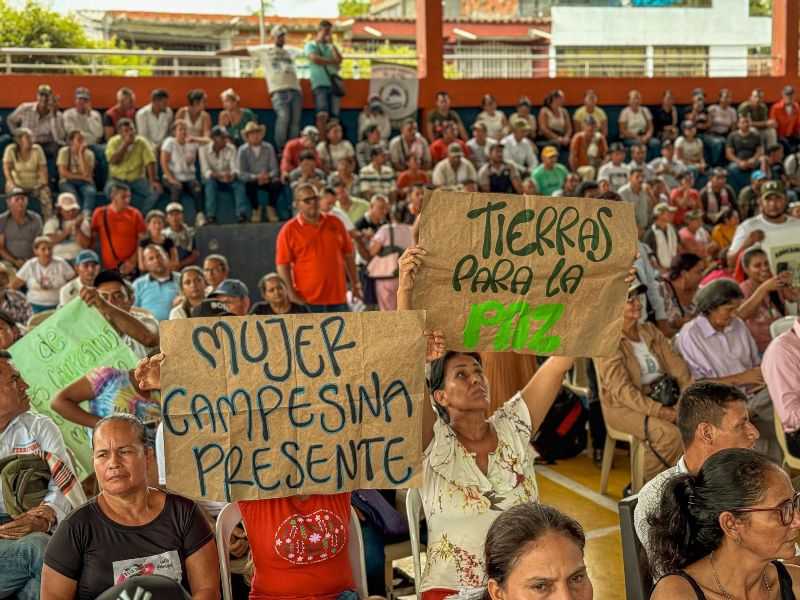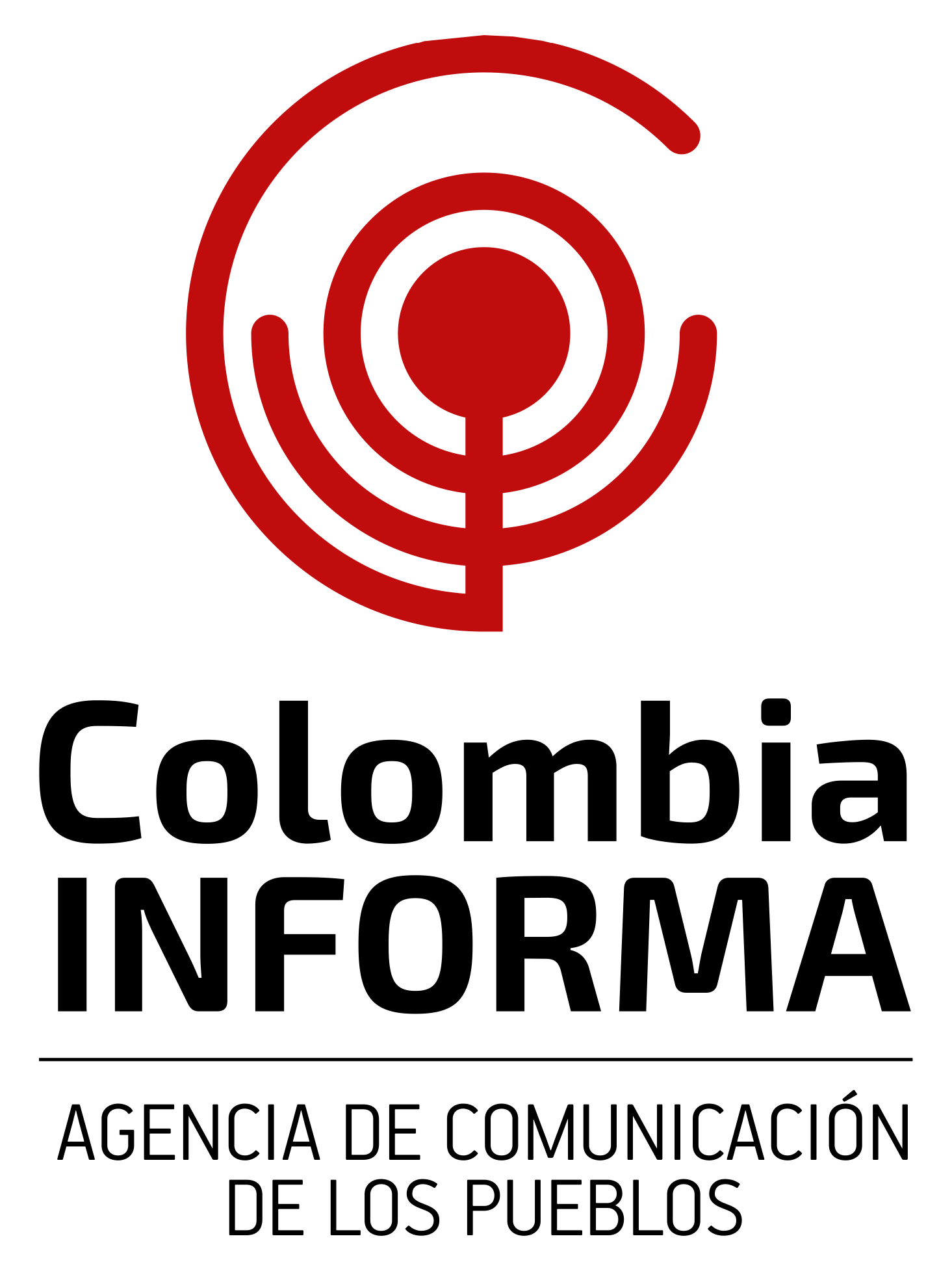
The long history of struggle for land rights shows how life in an independent country is still far from what the people of Pakel expected. Pakel is a village located in the Licin District of the Banyuwangi Regency, the most remote area of East Java, Indonesia. It is in an upper hilly area surrounded by forests. Although this area looks green and serene when seen from a distance, it cannot be categorized entirely as a forest because it is full of monoculture plants, cultivated by a company called PT Bumi Sari, which has been managing the residents’ lands for decades. Apart from this company, there is also a very large production forest controlled dominantly by Perhutani, a state-owned enterprise.
Borrowing from Dianto Bachriadi in his book Manifesto Penataan Ulang Penguasaan Tanah Kawasan Hutan (2020), the area we see now is not a forest but rather a territory whose function has changed, though it is still classified legally as a production forest area. In other words, it is a pseudo-forest. Although legally this area is still considered a production forest area, in reality, it has agricultural lands, settlements, and timber plantations now.
We can find this situation in areas that are territorially claimed as Perhutani's management areas, including in Pakel Village. Forest cover has been lost, changing its designation, from production forest to agricultural land, and even settlements. Because it is still claimed as a production forest area towards Perhutani concession which is managed by Forest Management Unit (KPH) in the West Banyuwangi and covers an area of 716.5 hectares, the tenure doesn’t allow the villagers and the village themselves to manage the area. Apart from dealing with the spatial claim of Perhutani, Pakel residents are also dealing with the spatial claim of PT Bumi Sari, which claims to have a plantation business permit in the Pakel village area. In fact, as recognized by the Banyuwangi Agriculture and Food Services, PT Bumi Sari's plantation area is only located in Bayu Village, Songgon District. Hence, a big question arises. Isn't this a case of land grabbing? Then why hasn’t any action been taken?
This condition raises big questions amid feelings of wonder and sadness. Pakel is now a village flanked by two giant companies who are both playing with legality to carry out territorial division or territorialization, as if it was their territory to begin with. In fact, there are residents in the area who live and depend on this land and forest for their livelihoods, but have limited access to the area. Some are farming in this area independently, some are cooperating with Perhutani, and some are becoming plantation workers. So, Pakel residents are mostly tenant farmers, agricultural laborers and plantation workers, who are now feeling marginalized because of these terrorized claims to their area in the name of legality and state legitimacy.
Rights of Pakel Residents
Some time ago, on March 24, 2021, WALHI Jatim (East Java) published a chronology of a century of resistance by Pakel farmers. This chronology is compiled based on the “Akta 29” or a letter of rights from the colonial era which is still archived neatly by the residents, and has been consulted by several academic networks, including universities like Brawijaya, Widayagama, and Diponegoro. Additionally, Pakel residents are still keeping the records of their struggles from the past, which makes it easier to compile the chronology.
The struggle of the Pakel residents began in 1925. There were around 2956 people who were represented by seven people. One of those representatives was Doelgani who struggled endlessly. They submitted a request in front of Dutch colonial government to open the Sengkan Kandang and Keseran forests, which are located in Pakel, Licin, Banyuwangi. Four years later, on January 11 1929, their petition was approved. These seven people were granted the right to open the forest areas for about 4000 shoulders (3000 hectares) by the Regent of Banyuwangi, R.A.A.M. Notohadi Suryo. In their journey, despite having the "Akta 1929" as a basis for their rights, activities of clearing the forest and planting crops were carried out by Doelgani and the other representatives. They often faced various intimidations and acts of violence from the Dutch colonial government, which continued into the Japanese era. Even so, Doelgani and the others continued to defend and cultivate crops on the "Akta 1929" land.
After the independence of the Republic of Indonesia, they tried to fight for their rights over forest clearing as stated in the "Akta 1929" with the government of the Republic of Indonesia, through the Regent of Banyuwangi. Until the issuance of the Basic Agrarian Law 1960, the land reform effort had not yet reached the Banyuwangi area, but farmers were still waiting and carrying out agricultural activities. In September 1965, a bloody tragedy caused an unfortunate chain of events, affecting the people of Sumberejo Pakel. They were accused of being PKI (Indonesian Communist Party), forcing people like Doelgani to suddenly disappear. Some people could not speak up, because there was always a threat that everyone fighting for their rights would be portrayed as one of the PKI.
In the 1970s, the “Akta 1929” area in Pakel village, which was historically cultivated by farmers, was claimed to belong to the PT Bumi Sari plantation. Furthermore, if you look at the Decree of the Ministry of Home Affairs, dated December 13, 1985, numbered SK.35 / HGU / DA / 85, it states that PT Bumi Sari only has Business Use Rights (HGU) with an area of 11,898,100 square meters or 1189.81 hectares, which is divided into 2 certificates, namely: HGU Certificate Number 1 Kluncing, covering an area of 1,902,600 square meters and HGU Certificate Number 8 Songgon, covering an area of 9,995,500 square meters. Clearly, these two decrees make it obvious that Pakel is not a part of the PT Bumi Sari’s business area.
In the midst of the repressive political climate of the authoritarian New Order regime, Pakel residents chose to remain silent and to not fight overtly. Meanwhile, PT Bumi Sari continued to claim the HGU up to Pakel Village.
In 1999, after Suharto's resignation, Pakel residents occupied the “Akta 1929” area. As a result, on 17 August 1999, several residents were arrested, imprisoned, and experienced various acts of physical violence from the security forces. Even then, in 2001, Pakel residents returned to occupy the "Akta 1929" area. In response, all the cottages and plants on the land were burned down by the state security apparatus. This incident caused most of the Pakel youth to drop out of school. Several residents were also forced to leave Pakel Village so as to avoid being arrested and chased by the security forces.
The Banyuwangi Regent Decree, numbered 188/402 / KEP / 429.011 / 2015 concerning the Determination and Confirmation of the Boundary of Pakel Village, Licin District, Banyuwangi Regency, also stated that there was no HGU that belongs to PT Bumi Sari in Pakel Village, Licin, Banyuwangi. This was confirmed by a circular from BPN Banyuwangi, numbered 280 / 600.1.35.10 / II / 2018, and dated February 14, 2018, which reaffirmed that Pakel Village land was not included in PT Bumi Sari's HGU. But in reality, even today, PT Bumi Sari still controls the land.
The population of Pakel is approximately 2,760. The area of Pakel Village is 1.309,7 hectares. However, in reality, the villagers only have the right to manage an area of approximately 321.6 hectares because there is PT Bumi Sari who claims to control 271.6 hectares, and there are 716.5 hectares controlled by Perhutani KPH West Banyuwangi. Consequently, we can imagine the problems citizens are facing. With such limited land, what can even be cultivated?
It is not surprising that many Pakel residents choose to migrate to the big cities or try to work in other sectors. This problem that has taken Pakel residents hostage is nothing more than a consequence of the history of land grabbing legitimized by the state. On the one hand, Perhutani included a large part of the Pakel village area in the category of production forest even though some areas are clearly agricultural. On the other hand, there is a village land that is claimed unilaterally by PT Bumi Sari.
Reclaiming as a Way of Struggle
On September 24, 2020, residents who had previously built an organization called Rukun Tani Sumberejo Pakel, took action to occupy the land claimed by PT Bumi Sari. This action is an affirmation that they are entitled to the land. Nearly ten years they struggled with pleading for the "kindness" of the government, but to no avail. They were ignored, and were not considered as citizens with legitimate right to manage their land and to live. Until they realized that reclaiming is the only way to get back their eroded rights, while fighting for recognition.
Choosing the reclaiming step in the midst of a repressive situation is not easy. Instead of getting recognized for their management rights, the threat of criminalization has come to the fore. Prior to reclaiming, Pakel residents had experienced intimidation and attempts at criminalization. Several people were summoned by the police, and there was one person who ended up being imprisoned, although in the end he was released. Now they face a similar threat, in which two citizens have been criminalized as a result of this action.
This reclaiming model is similar to what is called land reform by leverage or “agrarian reform from below.” According to Wiradi (in Sutaryono, Nugroho & Afifi, 2014), land reform by leverage is an effort to encourage changes in certain land tenure structures initiated directly by farmers in an organized manner. Citizens propose overtly that the land they control be recognized by the state rather than expecting the good of the state (by grace). If not recognized, they continue to occupy and manage it.
This story of the Pakel residents shows us the long road of struggle towards their rights. The Agrarian Reform Program of the Jokowi regime, which was predicted to solve the problem of inequality with land redistribution and agrarian conflicts, is still toothless. Why is that? Referring to Lutfi's research (2018), Jokowi's Agrarian Reform program, in practice, only seeks to accelerate land registration for certification, rather than resolving agrarian inequality and conflicts. As a result, today, we are still witnessing so many cases of agrarian conflicts, and struggles from the bottom, such as the case in Pakel, Banyuwangi.
Wahyu Eka Setyawan is Campaign Manager for WALHI East Java and Coklektif Editor.
Photo: Wahyu Eka Setyawan







